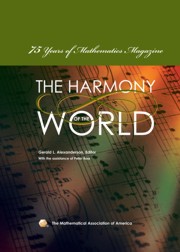Book contents
- Frontmatter
- Introduction
- Contents
- A Brief History of Mathematics Magazine
- Part I The First Fifteen Years
- Part II The 1940s
- Part III The 1950s
- The Harmony of the World
- What Mathematics Has Meant to Me
- Mathematics and Mathematicians from Abel to Zermelo
- Inequalities
- A Number System with an Irrational Base
- Part IV The 1960s
- Part V The 1970s
- Part VI The 1980s
- Briefly Noted
- The Problem Section
- Index
- About the Editors
The Harmony of the World
from Part III - The 1950s
- Frontmatter
- Introduction
- Contents
- A Brief History of Mathematics Magazine
- Part I The First Fifteen Years
- Part II The 1940s
- Part III The 1950s
- The Harmony of the World
- What Mathematics Has Meant to Me
- Mathematics and Mathematicians from Abel to Zermelo
- Inequalities
- A Number System with an Irrational Base
- Part IV The 1960s
- Part V The 1970s
- Part VI The 1980s
- Briefly Noted
- The Problem Section
- Index
- About the Editors
Summary
Editor's Note: Morris Kline was for many years Professor of Mathematics at New York University's Courant Institute of the Mathematical Sciences. He had received a PhD from NYU in 1930. Though initially his work was in topology, he moved into applied mathematics following a stay at the Institute for Advanced Study in Princeton and for some years he directed the Courant Institute's Division of Electromagnetic Research.
In 1953 he published an influential and popular book on the role of mathematics in society, Mathematics in Western Culture. This was followed in subsequent years by a series of books in this general area: Mathematics and the Physical World (1959); a history, Mathematical Thought from Ancient to Modern Times (1972); some textbooks, Mathematics for Liberal Arts (1967); Mathematics: a Cultural Approach (1962); Calculus, an Intuitive and Physical Approach (1967); Mathematics: The Loss of Certainty (1980); and a book on mathematics education, Why Johnny Can't Add: The Failure of the New Math (1973). The last was provocative and stirred up a great deal of controversy among mathematicians and mathematics educators. Another book was aimed at the university establishment, Why the Professor Can't Teach: Mathematics and the Dilemma of University Education (1977).
In this early paper we have a preview of the 1953 book on Western culture. Oddly enough, though Kline's own mathematical interests were largely in mathematical physics, in this book he makes a case for mathematics as a cultural component that should be in everyone's background, not just for students in the physical sciences and engineering but also those interested in intellectual history and the evolution of Western thought.
- Type
- Chapter
- Information
- Harmony of the World75 Years of Mathematics Magazine, pp. 71 - 78Publisher: Mathematical Association of AmericaPrint publication year: 2007



